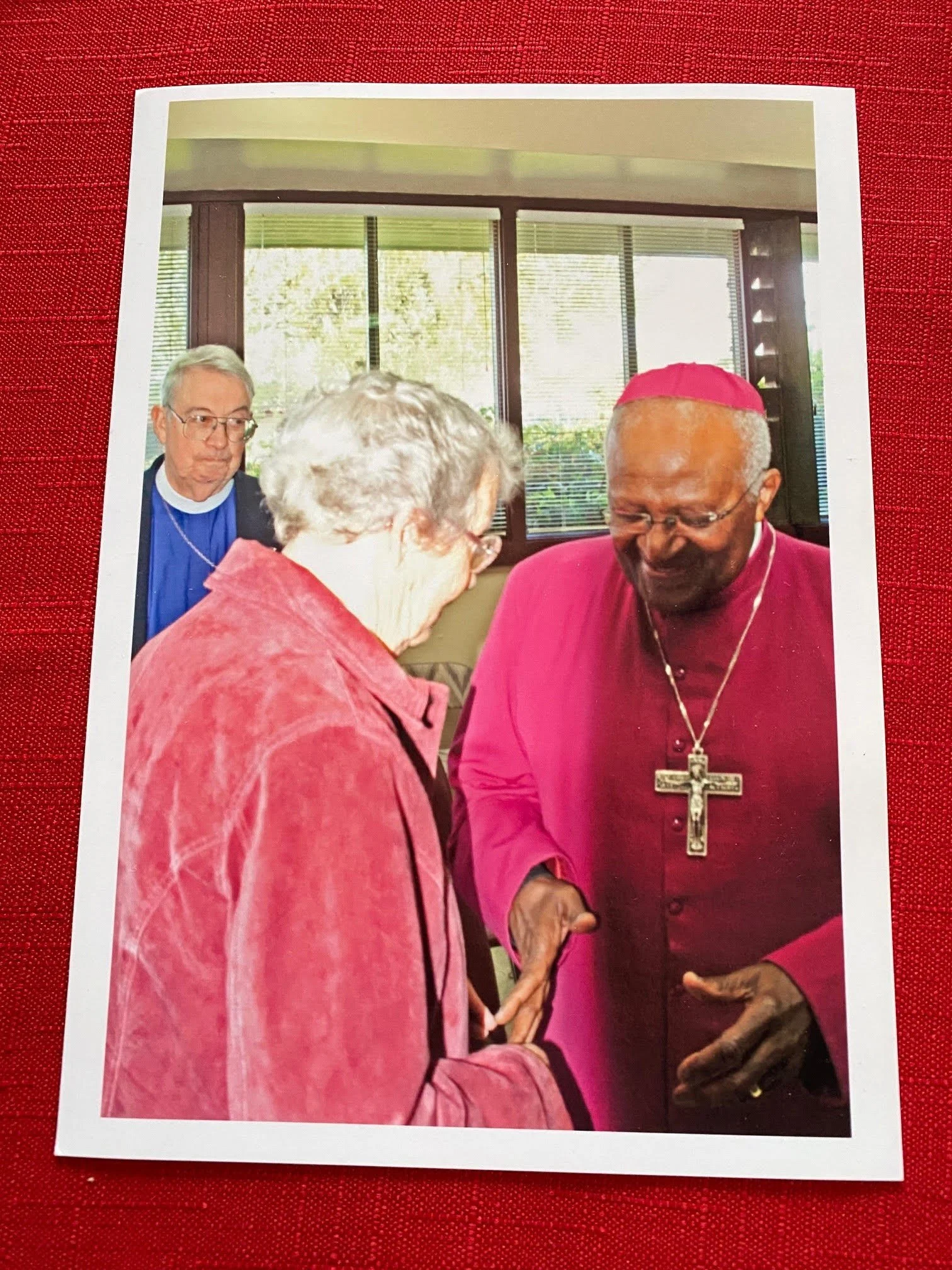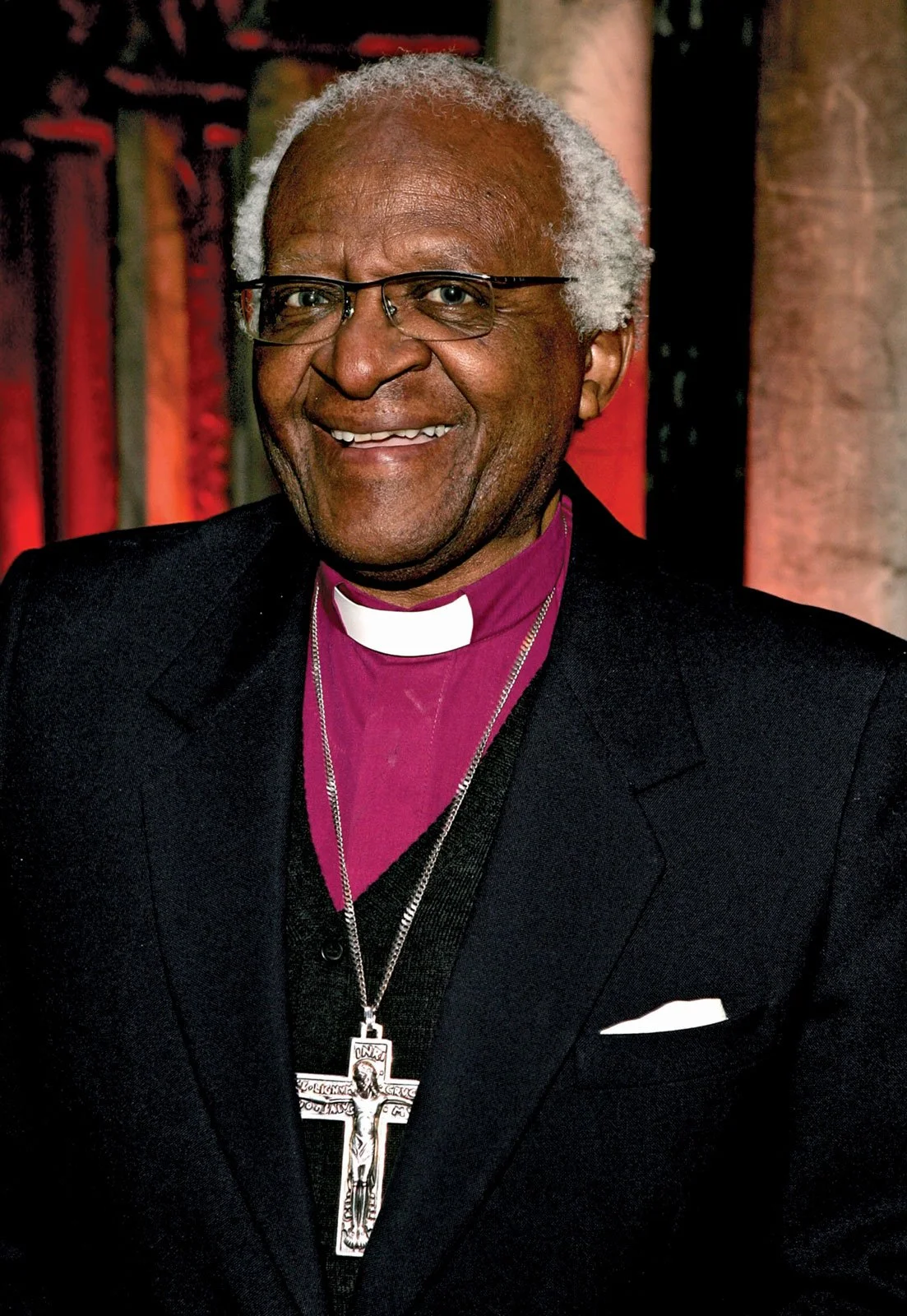Desmond Tutu's death recalls TD visit and friendship with 'RRRRRRusty’ Kimsey
From Karl Vercouteran - Rustin “Rusty” Kimsey was Bishop of the Episcopal Diocese of Eastern Oregon (1980-2000) and Archbishop Desmond Tutu was his guest here in The Dalles. This photo was sent to me by the son of Doris Anderson, who is visiting with Bishop Tutu in the photo, with Bishop Kimsey in the background. All three of the subjects in the photo have passed. The children of Doris Anderson said they would be thrilled to have this photo shared. Sam Muller took the photo.
Keith Mobley
Editor’s Note - The passing of Archbishop Desmond Tutu on Dec. 26 sent shock waves through the world with some landing in The Dalles. The Nobel Peace Prize-winning Anglican cleric whose good humor, inspiring message and conscientious work for civil and human rights made him a revered leader in the struggle to end apartheid. He was 90. Here are two local remembrances.
By Keith Mobley
The paths of two Bishops of the Anglican Communion crossed shortly before each was elected to become a Bishop. One was in the Episcopal Diocese of Eastern Oregon and the other as Bishop of the South African Diocese of Lesotho. They met in 1975 during an international meeting of church leaders and immediately became close friends.
When the Bishop from Eastern Oregon died, the Bishop from South Africa came to his services in The Dalles, Oregon. And now, the Bishop from South Africa has also moved on, hopefully to a reunion with his friend, Rustin ‘RRRRRRusty’ Kimsey, as Desmond Tutu enjoyed rolling his ‘R’s!
The Elder Bishop
Desmond Mpilo Tutu was born on Oct. 7, 1931, in what is now the North West Province of South Africa. His mother was a domestic worker; his father taught at a Methodist school. He became a teacher but turned to the ministry. He graduated from St. Peter’s Theological College in Johannesburg and was ordained an Anglican priest in 1961. After serving several churches, he decided to further his education in England, where he earned a bachelor of divinity degree and a master’s in theology from King’s College in London.
He became leader of the South African Council of Churches and later was named Anglican archbishop of Cape Town. Archbishop Tutu led the church to the forefront of Black South Africans’ decades-long struggle for freedom. His work won a Nobel Peace Prize in 1984. After that honor, he became the first Anglican bishop of Johannesburg, and he was named archbishop of Cape Town in 1986, becoming spiritual head of the country’s 1.5 million Anglicans, 80 percent of whom were Black.
While not of imposing physical stature, he was a giant in courage, demonstrated in 1985 when the Bishop waded into a crowd to rescue a Black police informer from an angry mob. He was fearless in criticizing political leaders, both in his country and in the United States. Archbishop Tutu spoke out against President Ronald Reagan’s policy of “constructive engagement,” which was intended to show impartiality in South African domestic affairs for what were reported to be strategic reasons. His comment: “To be impartial,” he said, “is indeed to have taken sides already with the status quo.”
The Younger Bishop
A sixth-generation Oregonian, Rustin Ray (Rusty) Kimsey was born in Bend on June 20, 1935, to Lauren C. Kimsey and Lois E. (Moorhead) Kimsey. He attended schools in Bend and Hermiston and graduated from the University of Oregon in 1957 with a degree in history. Raised in the Episcopal Church, he aspired to become a priest. He moved from Eugene to Boston, earning a degree from the Episcopal Theological School in 1960. His father had been on a Red Sox farm team in his youth, and the time in Boston made a Rusty a lifelong Red Sox fan. He was ordained in December of 1960 and ministered to congregations in Redmond, Baker and The Dalles. He and Gretchen were married and have two children, Sean and Megan.
Sean lauds his parents for giving him and his sister a grounded view of the church. He said they did that not only by example but by the people they chose to surround themselves with. “People gravitated to him,” Sean said. He was elected the Fifth Bishop of the Diocese of Eastern Oregon in 1980. Even after his election, he preferred “Rusty” to the other honorifics to which he was entitled. An avid outdoorsman, he was recalled in one story as a “man’s man.”
Always active in leadership roles in the Episcopal Church, Rusty was appointed by Oregon’s Governor to serve on the Columbia River Gorge Commission in 1981; he was reappointed in 1984. He was key in building a relationship with the Department of Human Services that allows a number of churches in the Portland area to serve the foster-care system today. Another favorite activity was service on the board of directors of the Ecumenical Ministries of Oregon, a state-wide body of 14 denominations.
The force that drew these two men together was humor. Both loved to laugh and to bring cause for laughter to others. Humor and selflessness in its application was the source of much of their power. Power for them was enhanced through their demonstration and interpretation of the principles of their church, encouraged in the lives of the people they served.
Both had a practical side, and an understanding of the art of politics. Rusty worked closely with federal, state and local governments in addressing social issues. I had the good fortune to be Senior Warden at St. Paul’s Episcopal Church in The Dalles when he decided to seek election as Bishop of the Diocese of Eastern Oregon and witnessed his political skills. Bishop Tutu regularly spoke truth to power, and was a great friend and supporter of Nelson Mandela. Through all of their later lives, the two remained close.
In 1984, just months prior to being awarded the Nobel Peace Prize, Bishop Desmond Tutu and his family visited Eastern Oregon, staying with the Kimsey's in The Dalles and then leading an adult education forum at Ascension Episcopal Camp and Conference Center in Cove, Oregon. This was made possible when Bishop Kimsey initiated an invitation and sought approval for travel to the Episcopal Diocese of Eastern Oregon. Despite long odds, the request was approved by both the South African and United States authorities.
In May of 2009, Archbishop Tutu agreed to be the keynote speaker at the 40th annual Collins Lecture, which was held at the University of Portland Chiles Center and presented by Ecumenical Ministries of Oregon (EMO). Because of his relationship with Bishop Kimsey, Archbishop Tutu, his wife Leah and his son-in-law/executive assistant M'Thunzi visited the Kimseys and attended church at St. Paul's Episcopal Church in The Dalles. Many locals remember well this visit and the opportunity to meet face to face in Taylor Hall with Desmond and Leah Tutu both before and after worship in Taylor Hall.
Archbishop Tutu's final visit to The Dalles came when he agreed to attend the funeral following the death of his longtime friend and peer, Bishop Rustin Kimsey in April of 2016. Tutu and his daughter M'Pho flew by charter to Portland from India, where he had been putting the finishing touches on a collaborative work with the Dalai Llama, a book entitled, The Book of Joy.
The last time I spoke with Rusty was in early April of 2015. We knew time was short, but we had much to share as we had not been in touch for some time. As the conversation drew to a close, I remarked on how well he had done in marriage. He agreed that he had been most fortunate in 53 years of marriage to Gretchen, and we said our goodbyes.
Upon hearing of the death of Archbishop Desmond Tutu, my first thought was of Rusty. I called Gretchen to share those thoughts. The call was dropped two or three minutes into our conversation. I dialed again, we picked up our conversation, and it dropped again. When I got Gretchen back on the line again, she said “someone does not want us to be talking.” With a third drop, I did not try again but thought about what she said. Who would that someone be?
Only someone of real modesty, a sense of humor and real power would repeatedly interrupt a phone call intended to honor them. Two Bishops might be able, together, to do it? Their lifetimes of accomplishment make it seem possible, if not plausible.
We will long remember both of these Bishops, for their good works, their joy, and their inspiration.
From Kristine Vercouteren’s Facebook Page:
Kristine Vercouteren of The Dalles
I’m so sad to hear about the passing of Archbishop Desmond Tutu. I hold close in my heart the several times I was blessed to meet him and share a laugh! The first time I met him was in St. Louis in the early ’90s at a UCC conference. There were terrible floods there and part of a service project I took part in was to help with sandbagging to assist the community from further damage. He arrived in a big white limousine (not his call!) and when he stepped out to help I greeted him as if I’d known him forever with a big smile and thanked him for being there! He walked the talk and filled sandbags, blessed them and laid them down beside all of us there. Many years later he was in The Dalles for the funeral of his dear friend Rusty Kimsey. My father had a brief conversation with him about their shared love and friendship with Rusty and mentioned my meeting him. He remembered our encounter! Then later after the service I had a moment to see him myself and thank him for being such an amazing human being and loving our friend Rusty and his Kimsey family. He remembered me, and we laughed about how crazy yet simple it was that the love of family and friends brought us together again. My heart is sad that the whole world has lost a Holy man, closest to a Saint to be among us.





